For indigenous and tribal cultures, increasing involvement in global culture and new technologies, such as mobile phone networks, has led to increasing dependence upon cash income. In Suriname, villages are emptying out as residents increasingly leave their communities for extended periods to seek wages in extractive industries such as logging and mining. Such activities are environmentally unsustainable, hazardous to health, and associated with ongoing loss of culture, traditional territory and knowledge.
To address this challenge, the Amazon Conservation Team (ACT) has, for many years, been involved in research and support for the development of non-timber forest products (NTFPs) as sustainable, locally-based economic alternatives. In Suriname, ACT is currently working hand-in-hand with partner communities to promote locally produced handicrafts, herbal tea, hot pepper, and honey.
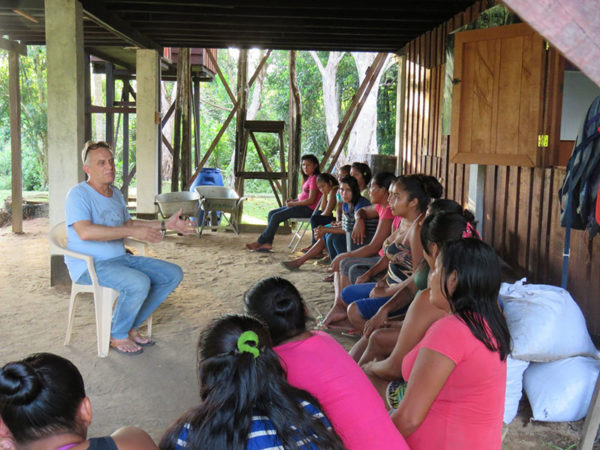
Bruce Hoffman, ACT’s Land and Resources Specialists conducting training
Herbal Tea
The ACT-guided herbal tea project began in the village of Kwamalasamutu (remote southwestern Suriname), in mid-2017. There was little participation in the first months of the initiative because herbal tea production was an unfamiliar activity. The community used herbs as medicine, but it was not a cultural norm to make herbal tea as a beverage. Fortunately, as the tea project pilot activities progressed and participants received compensation, interest notably increased.
Although participation was open to all villagers, from the beginning it was primarily younger women that expressed interest. In 2018, the number of tea producers has steadily increased each month, and today there are 40 enthusiastic participants from diverse family units and sub-cultures in the village. A local female leader has been hired and trained to ensure that protocols are followed with respect to sustainable harvest, hygiene, efficiency, record-keeping, payments and adaptive management of the project.
ACT is currently working with tea project participants to establish a group or cooperative to build skills in local management of the project and to create a common fund to build financial independence and invest in supplies. Simultaneously, ACT has connected the community project with a company in Paramaribo that will take responsibility for the purchase and marketing of herbal tea product from Kwamalasamutu. Payments are based simply upon the kilograms of quality tea that are produced – there are no monthly salaries. ACT aims to serve as a temporary bridge that will eventually be only indirectly involved in the value chain and marketing of the product.
The product and process: on a given work day, participants fan out to different areas of the village and forest where the tea plants are located. They collect and cut the plant material with machetes or knives, being sure to leave roots in the ground so the plants can regrow.
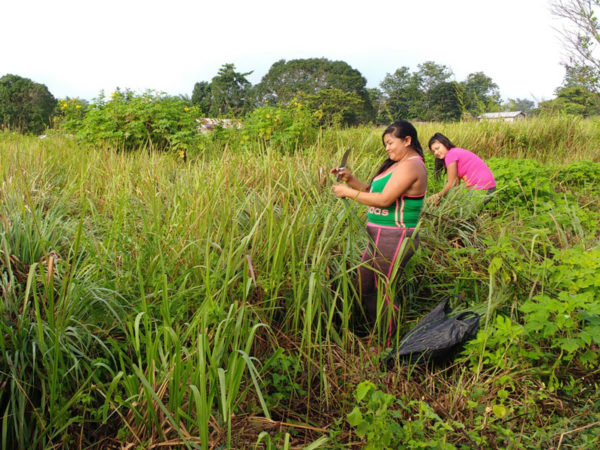
Harvesting lemongrass for herbal tea
The plant material is washed and brought to a central processing area and drying house. The participants then cut the plant material into small pieces and place it on wooden trays to dry.
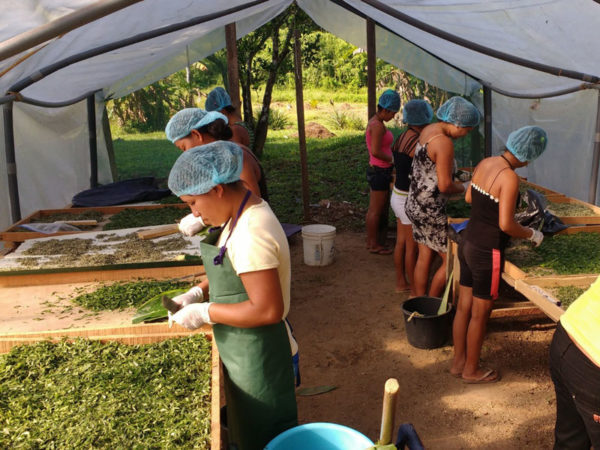
Cutting spiral ginger leaf material
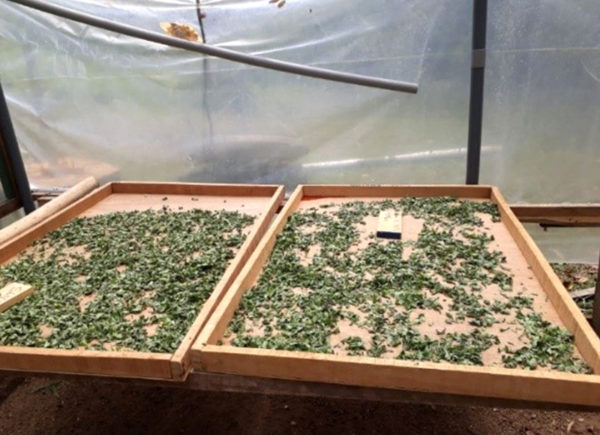
Spiral ginger herbal tea on drying trays
Over the course of one to two days, participants must return regularly to the drying house and turn the tea to make sure it dries efficiently. Once sufficiently dry, the tea is placed in zipper storage bags, weighed, and sent out to the capital city of Paramaribo. In Paramaribo, the Green Child company picks up the tea material, checks the quality and processes it. The final product is a paper packet with an attractive brand label that holds 20g of herbal tea. From April to September, approximately 75 kg of herbal tea were produced in Kwamalasamutu. It is envisioned that the tea project will continue to expand as we diversify the product through testing of different blends and the participants gain experience and become increasingly independent.
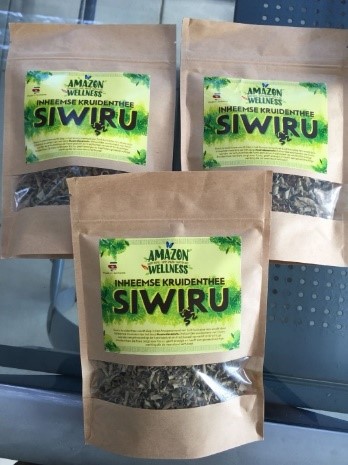
Siwiru (spiral ginger) herbal tea in 20g packages
Four types of tea have been tried in pilot studies: spiral ginger, wild ginger, lemongrass, and cat’s claw. The first three are monocot species. Monocots are known for resilience and rapid regrowth from tubers or rhizomes and are promising for sustainable harvest from the wild and for cultivation. Lemongrass is a non-native plant that was sown in years past and occurs in one large cluster in the village. We have recommended that the herbal tea participants spread the lemongrass around the village and plant it in their fields to ensure sufficient product in the future. Cat’s claw is a very common and prolific liana growing in secondary and primary forest. Currently, harvesters are primarily harvesting spiral ginger, known as siwiru in the Trio language. The teas are considered general tonics for a feeling of well-being and relaxation and are not being promoted as strict medicine.
Share this post
Bring awareness to our projects and mission by sharing this post with your friends.


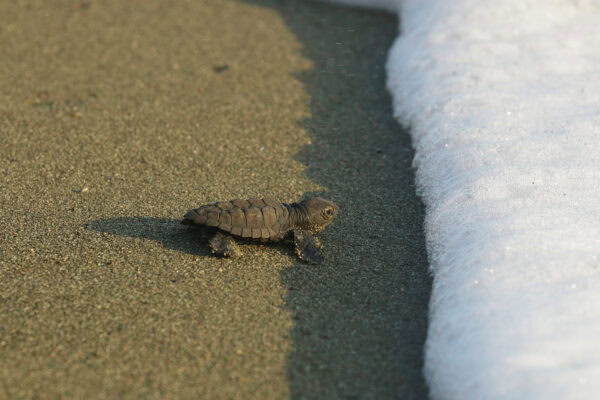
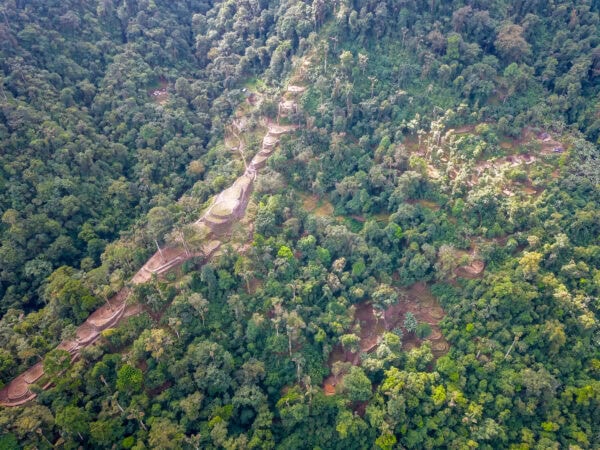
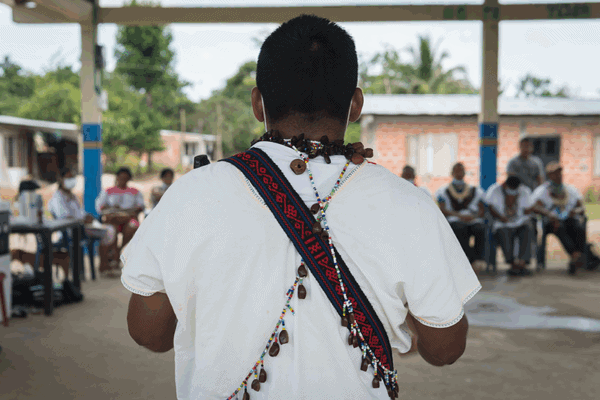
Dr. Hoffman- I am working on a biography of Ted Parker, the ornithologist, with whom I believe you went to Guyana in February, 2013. It has been most interesting to trace the arc of your career in my effort to locate you via the web!
I wonder whether you may be willing to tell me about your memories of that expedition. (I never knew Ted, so must rely on those who did in order to tell his story.)
My email is HomoAves@gmail. com. I look forward to your reply, and very much appreciate any help you can provide.